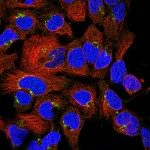Lien vers Pubmed [PMID] – 30690184
Lien DOI – S1568-1637(18)30261-710.1016/j.arr.2019.01.012
Ageing Res Rev 2019 03; 50(): 89-101
Parkinson’s disease (PD) is the second most common neurodegenerative disorder after Alzheimer’s disease. PD is characterized by the loss of dopaminergic neurons, primarily in brain regions that control motor functions, thereby leading to motor impairments in the patients. Pathological aggregated forms of the synaptic protein, α-synuclein (α-syn), are involved in the generation and progression of PD. In PD brains, α-syn accumulates inside neurons and propagates from cell-to-cell in a prion-like manner. In this review, we discuss the in vitro and in vivo models used to study the prion-like properties of α-syn and related findings. In particular, we focus on the different mechanisms of α-syn spreading, which could be relevant for the development of alternative therapeutic approaches for PD treatment.


